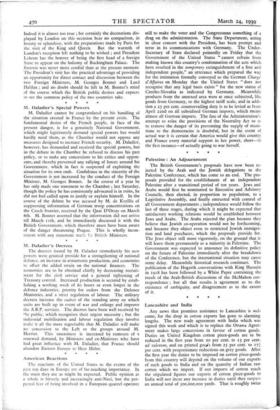The reactions of the United States to the events of
the past ten days in Europe are of far-reaching importance. In the main they are as might be expected. Public opinion as a whole is bitterly and increasingly anti-Nazi, but the per- petual fear of being involved in a European quarrel operates still to make the voter and the Congressman something of a drag on the administration. The State Department, acting in close concert with the President, has been prompt and terse in its communications with Germany. The Under- Secretary of State declared pointedly on Friday that the Government of the United States "cannot refrain from making known this country's condemnation of the acts which have resulted in the temporary extinguishment of a free and independent people," an utterance which prepared the way for the intimation formally conveyed to the German Chargé d'Affaires on Monday that the United States "does not recognise that any legal basis exists" for the new status of Czecho-Slovakia as indicated by Germany. Meanwhile products from the annexed area were at once subjected, like goods from Germany, to the highest tariff scale, and in addi- tion a 25 per cent. countervailing duty is to be levied as from April 22nd on all subsidised German imports, which means almost all German imports. The fate of the Administration's attempt to relax the provisions of the Neutrality Act so as to remove the danger of its preventing the supply of muni- tions to the democracies is doubtful, but in the event of actual war it is certain that America would give this country and France every material support in her power, short—in the first instance—of actually going to war herself.
* * * *














































 Previous page
Previous page